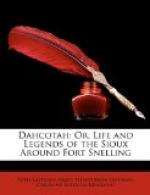“In the mean time the other Indians had been killing our cattle; and some of the animals having run away, they made Watson, who was sadly bruised with the blows he had received from them, mount a horse and go with them to hunt the rest of the cattle. We never heard of him again. The Indians say he disappeared from among the bushes, and they could not find him; but the probability is that they killed him. Some seemed to wish to kill Turner and myself—but after a while they told us to go, giving us our horses and a little food. We determined to retrace our steps. It was the best thing we could do; but our horses gave out, and we were obliged to leave them and proceed on foot.
“We were soon out of provisions, and having no means of killing game, our hearts began to fail us. Turner was unwell, and on arriving at a branch of Crow river, about one hundred miles northwest of Fort Snelling, he found himself unable to swim. I tried to carry him across on my back, but could not do it; he was drowned, and I barely succeeded in reaching the shore. After resting, I proceeded on my journey. When I came in sight of the Indian village, much as I needed food and rest, I dreaded to show myself, for fear of meeting Watson’s fate. I was spared the necessity of deciding. I fainted and fell to the ground. They found me, and proved kinder than I anticipated.
“Why they should have molested us I know not. There is something in it that I do not understand.”
But it is easily explained. Sullen Face supposed them to belong to the party that had killed his friends, and through this error he had shed innocent blood.
CHAPTER IV.
Who that has seen Fort Snelling will not bear testimony to its beautiful situation! Whichever way we turn, nature calls for our admiration. But beautiful as it is by day, it is at night that its majesty and loveliness speak to the soul. Look to the north, (while the Aurora Borealis is flashing above us, and the sound of the waters of St. Anthony’s Falls meets the ear,) the high bluffs of the Mississippi seem to guard its waters as they glide along. To the south, the St. Peter’s has wandered off, preferring gentle prairies to rugged cliffs. To the east we see the “meeting of the waters;” gladly as the returning child meets the welcoming smile of the parent, do the waves of the St. Peter’s flow into the Mississippi. On the west, there is prairie far as the eye can reach.
But it is to the free only that nature is beautiful. Can the prisoner gaze with pleasure on the brightness of the sky, or listen to the rippling of the waves? they make him feel his fetters the more.
I am here, with my heavy
chain!
And I look
on a torrent sweeping by.
And an eagle
rushing to the sky,
And a host to its battle
plain.
Must I pine in my fetters
here!
With the
wild wave’s foam and the free bird’s flight,
And the
tall spears glancing on my sight,
And the trumpet in mine
ear?




